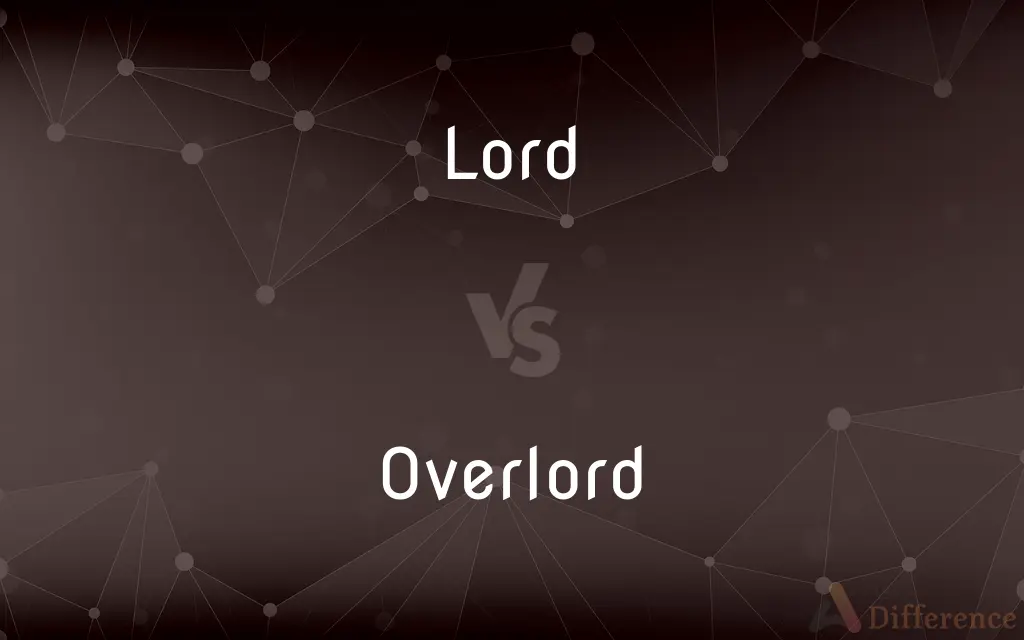Lord vs. Overlord — What's the Difference?
By Tayyaba Rehman & Maham Liaqat — Updated on April 8, 2024
Lord typically refers to someone with authority, control, or power over others, often in a feudal setting. Overlord implies a higher level of dominance, usually overseeing multiple lords or territories.

Difference Between Lord and Overlord
Table of Contents
ADVERTISEMENT
Key Differences
A lord is often recognized within a specific territory or domain, holding authority and responsibility over its inhabitants and land. They play a significant role in governance and local justice. Whereas, an overlord possesses a superior rank, exerting control over several lords and their respective domains, symbolizing a higher echelon of power and influence.
Lords are historically tied to the feudal system, where they managed estates, collected taxes, and provided military protection. Their power was direct but limited to their own lands. On the other hand, overlords were at the apex of the feudal hierarchy, overseeing multiple lords, which often included vassals of vassals, extending their influence over vast regions.
The term "lord" also carries a broad spectrum of applications beyond feudal titles, including generic uses in religious contexts or as a term of respect. Overlords, however, are predominantly referenced in contexts emphasizing supremacy and overarching authority.
In modern usage, "lord" can signify a variety of ranks and titles in different societies, including legislative titles in some countries. Overlords are less commonly referenced in contemporary contexts, often appearing in historical discussions or speculative fiction to denote a powerful ruler or entity with wide-reaching power.
The relationship between a lord and their subjects is traditionally one of mutual obligation, where protection and justice are exchanged for loyalty and service. Overlords, however, maintain a more distant, overarching authority, primarily concerned with the loyalty and tribute of their subordinate lords rather than the direct welfare of the populace.
ADVERTISEMENT
Comparison Chart
Definition
A person with authority over a particular area, often feudal.
A ruler who has control over other lords or territories.
Context
Feudal system, religious, respect
Historical, speculative fiction, supreme authority
Power Scope
Direct control over a specific territory
Broad authority over multiple territories or lords
Contemporary Use
Titles, legislative roles, religious honorifics
Mostly historical or fictional references
Relationship
Mutual obligation with subjects
Overarching authority, indirect relationship with populace
Compare with Definitions
Lord
A religious title.
Praise the Lord is a common phrase in Christian prayers.
Overlord
Fictional character of power.
In the novel, the overlord controlled an army of mythical creatures.
Lord
A feudal superior.
The lord of the manor taxed his subjects.
Overlord
A title indicating supreme authority.
In the empire, the overlord had the final say in all matters.
Lord
A legislative title in some countries.
The Lords in the UK are part of the Parliament.
Overlord
A ruler over other lords.
The overlord demanded tribute from his vassals.
Lord
A title of nobility.
Lord Smith attended the queen's council.
Overlord
A symbol of dominance.
The company acted as an overlord in the industry, overshadowing smaller businesses.
Lord
A respect term.
The servants referred to their employer as the lord of the house.
Overlord
Historical supreme leader.
The Mongol overlords ruled over vast territories in Eurasia.
Lord
Lord is an appellation for a person or deity who has authority, control, or power over others, acting as a master, a chief, or a ruler. The appellation can also denote certain persons who hold a title of the peerage in the United Kingdom, or are entitled to courtesy titles.
Overlord
An overlord in the English feudal system was a lord of a manor who had subinfeudated a particular manor, estate or fee, to a tenant. The tenant thenceforth owed to the overlord one of a variety of services, usually military service or serjeanty, depending on which form of tenure (i.e.
Lord
A king.
Overlord
A lord having power or supremacy over other lords.
Lord
A territorial magnate.
Overlord
One in a position of supremacy or domination over others.
Lord
The proprietor of a manor.
Overlord
A ruler of other rulers.
The various tribal chieftains met each spring to elect an overlord that would lead them in time of war.
Lord
Lords The House of Lords.
Overlord
(historical) A feudal lord directly owed rent or personal service by a tenant of subinfeudated land, a tenant's liege lord.
Lord
Used as a form of address for a marquis, an earl, or a viscount.
Overlord
Anyone with overarching power or authority in a given domain.
The crusty old professor was overlord of the history department, and few dared to cross his will.
Lord
Used as the usual style for a baron.
Overlord
To rule over; to domineer.
Lord
Used as a courtesy title for a younger son of a duke or marquis.
Overlord
One who is lord over another or others; a superior lord; a master.
Lord
Used as a title for certain high officials and dignitaries
Lord Chamberlain.
The Lord Mayor of London.
Overlord
A person who has general authority over others
Lord
Used as a title for a bishop.
Lord
God.
Lord
(Christianity) Jesus.
Lord
A man of renowned power or authority.
Lord
A man who has mastery in a given field or activity.
Lord
(Archaic) The male head of a household.
Lord
(Archaic) A husband.
Lord
To insist upon or boast about so as to act in a domineering or superior manner
"He had lorded over her his self-proclaimed spiritual and poetic superiority" (David Leavitt).
Lord
To act in a domineering or superior manner
An upperclassman lording over the younger students.
Lord
To have a prominent or dominating position
The castle lords over the valley.
Lord
To rule over
Lorded over a vast empire.
Lord
(obsolete) The master of the servants of a household; (historical) the master of a feudal manor
Lord
(archaic) The male head of a household, a father or husband.
Lord
(archaic) The owner of a house, piece of land, or other possession
Lord
One possessing similar mastery over others; (historical) any feudal superior generally; any nobleman or aristocrat; any chief, prince, or sovereign ruler; in Scotland, a male member of the lowest rank of nobility (the equivalent rank in England is baron)
Lord
(historical) A feudal tenant holding his manor directly of the king
Lord
A peer of the realm, particularly a temporal one
Lord
A baron or lesser nobleman, as opposed to greater ones
Lord
One possessing similar mastery in figurative senses (esp. as lord of ~)
Lord
A magnate of a trade or profession.
Lord
(astrology) The heavenly body considered to possess a dominant influence over an event, time, etc.
Lord
A hunchback.
Lord
Sixpence.
Lord
Domineer or act like a lord.
Lord
(transitive) To invest with the dignity, power, and privileges of a lord; to grant the title of lord.
Lord
A hump-backed person; - so called sportively.
Lord
One who has power and authority; a master; a ruler; a governor; a prince; a proprietor, as of a manor.
But now I was the lordOf this fair mansion.
Man over menHe made not lord.
Lord
A titled nobleman., whether a peer of the realm or not; a bishop, as a member of the House of Lords; by courtesy; the son of a duke or marquis, or the eldest son of an earl; in a restricted sense, a baron, as opposed to noblemen of higher rank.
Lord
A title bestowed on the persons above named; and also, for honor, on certain official persons; as, lord advocate, lord chamberlain, lord chancellor, lord chief justice, etc.
Lord
A husband.
Thou worthy lordOf that unworthy wife that greeteth thee.
Lord
One of whom a fee or estate is held; the male owner of feudal land; as, the lord of the soil; the lord of the manor.
Lord
The Supreme Being; Jehovah.
Lord
The Savior; Jesus Christ.
Lord
To invest with the dignity, power, and privileges of a lord.
Lord
To rule or preside over as a lord.
Lord
To play the lord; to domineer; to rule with arbitrary or despotic sway; - sometimes with over; and sometimes with it in the manner of a transitive verb; as, rich students lording it over their classmates.
The whiles she lordeth in licentious bliss.
I see them lording it in London streets.
And lorded over them whom now they serve.
Lord
Terms referring to the Judeo-Christian God
Lord
A person who has general authority over others
Lord
A titled peer of the realm
Lord
Make a lord of someone
Common Curiosities
What is a lord?
A lord is a person with authority, control, or power over a specific area or group, often within a feudal system.
Did overlords have direct control over the populace?
Overlords had indirect control, primarily concerned with the loyalty and tribute of their subordinate lords.
How were disputes settled under an overlord's rule?
Disputes were often settled by the immediate lord, but significant issues could be escalated to the overlord.
What does overlord mean?
An overlord refers to a ruler who has control over other lords or territories, usually indicating a higher level of dominance.
Can a lord also be an overlord?
Yes, a lord can also act as an overlord if they have other lords under their authority.
Are there modern examples of lords and overlords?
Modern examples of lords include legislative titles or landowners in some countries, while overlords are less common and more historical or fictional.
Is the concept of an overlord still relevant today?
While less common, the concept persists in historical studies, literature, and discussions of hierarchical power structures.
Were all lords noble?
While many lords were nobles, the term can also apply to non-noble persons granted land and authority.
How does an overlord differ from a lord?
An overlord has broader authority, often over multiple lords and territories, whereas a lord's control is typically limited to their own domain.
Did overlords participate in warfare?
Overlords could command military forces, often drawn from their vassal lords, in larger regional or national conflicts.
How was someone chosen to be an overlord?
Overlords were typically born into their positions or ascended through conquest, inheritance, or appointment.
How does the role of a lord or overlord compare to modern political leaders?
Modern political leaders may share similar responsibilities for governance and protection but are usually elected or appointed rather than inheriting their positions.
What responsibilities did a lord have?
Lords were responsible for managing their estates, providing military protection, and ensuring justice within their domains.
What was the relationship between a lord and their overlord?
The relationship was one of fealty, where the lord owed military and financial allegiance to the overlord.
Could a commoner become a lord or overlord?
Historically, it was rare but not impossible for a commoner to become a lord through acts of valor, marriage, or royal appointment.
Share Your Discovery

Previous Comparison
String vs. Stream
Next Comparison
Nada vs. SlangAuthor Spotlight
Written by
Tayyaba RehmanTayyaba Rehman is a distinguished writer, currently serving as a primary contributor to askdifference.com. As a researcher in semantics and etymology, Tayyaba's passion for the complexity of languages and their distinctions has found a perfect home on the platform. Tayyaba delves into the intricacies of language, distinguishing between commonly confused words and phrases, thereby providing clarity for readers worldwide.
Co-written by
Maham Liaqat













































